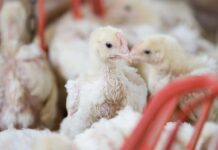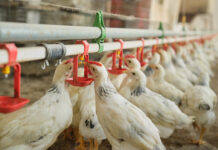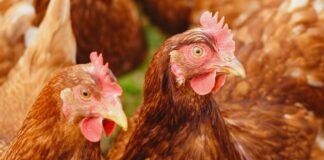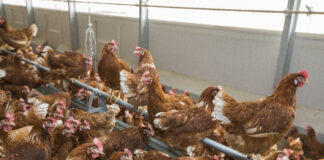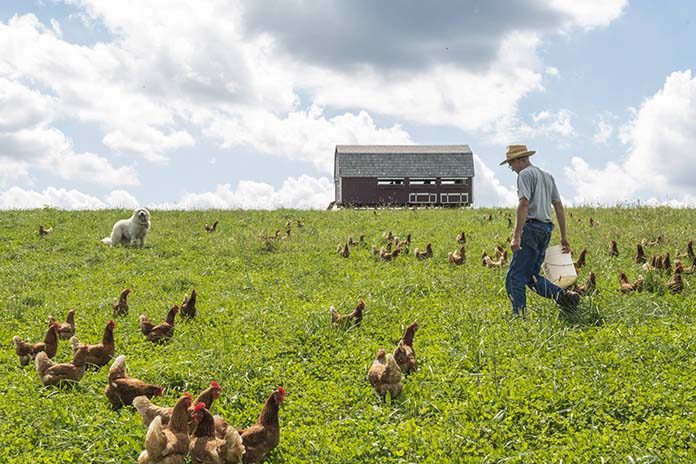
It is prudent in today’s age that farmers uphold high-level compliance of biosecurity practices on Australian commercial chicken farms. This is especially so with the large, recent expansion of free-range farms due to consumer demand, which has raised concerns amongst industry experts of the potential increase in disease introduction and spread from more interactions between wildlife and chickens.
Farmer compliance with biosecurity practices is dependent on a number of psychological factors, including perceived importance of biosecurity practices and personality traits. An on-farm survey was conducted which interviewed 25 free range layer farms, nine cage layer farms, nine barn layer farms, 15 free range meat chicken farms, and 15 barn meat chicken farms. This survey involved on-farm interviews, which asked questions on farmer perceived importance of biosecurity practices and actual performance on farm. Invariable logistic regression analyses were used to estimate the association between farmer perceived importance of these practices and actual performance. It was found that there were significant statistical associations (P<0.05) between reported compliance and the perceived importance of all biosecurity practices except for disinfection of equipment between sheds (P=0.71). In addition, all significant associations were positive (OR>1), with the exception of rodent control and wild bird proofing sheds. A literature review also identified that personality traits were found to influence job compliance. The Work Approach and Behaviour Test is a personality test based on the five factors; emotional stability, extraversion, open-mindedness, agreeableness and conscientiousness. Racicot, Venne, Durivage, and Vaillancourt (2012) found that personality traits grouped under conscientiousness and emotional stability were found to be significantly associated with positive famer biosecurity practice compliance in commercial poultry farms in Canada. Further research on personality traits influencing farmer biosecurity practice compliance, especially in the context of Australian commercial farms, is needed due to the limited area of this research.
The Australian commercial chicken industry is experiencing major changes; a significant proportion of both meat and layer farm types are becoming free range and this is driven by consumer demand. Amongst industry experts, there is concern the risk of disease introduction and spread in Australian commercial chicken farms will be raised from the increased potential of interactions between wildlife and commercial chickens on free-range farms. It is therefore prudent on today’s farms that farmers uphold strict biosecurity on their farms to reduce the potential for disease introduction and spread. There are various factors influencing farmer compliance of biosecurity practices on farms; including farmer-perceived importance of biosecurity practices which is influenced from farmer education and training, and farmer personality traits. This study details results obtained from an on-farm survey conducted on Australian commercial chicken farms of farmer perceived importance of biosecurity practices and correlation with actual on-farm performance of those biosecurity practices. This study also evaluated personality traits that strongly influence job performance for a number of workplaces, as well as biosecurity practice compliance on commercial chicken farms through a literature review.
A research project was commenced in 2015 to quantify the likelihood of Avian Influenza (AI) virus introduction and spread between different types of commercial chicken farms in Australia and to evaluate the reduction in likelihood of alternate on-farm mitigation actions. This project involved an on-farm survey which was conducted on commercial chicken farms in the Sydney basin and South-East Queensland regions of Australia from June 2015 to February 2016. In total, 25 free range layer farms, nine cage layer farms, nine barn layer farms, 15 free range meat chicken farms and 15 barn meat chicken farms were visited. Commercial layer farms were defined as those having more than 1,000 hens, and commercial meat chicken farms were defined as those having more than 25,000 birds. The survey involved conducting on-farm interviews on each of these farms where a range of questions was asked which captured data related to general farm information, water source and use, poultry health, range information, farmer observations of wild birds and other wild animals, and biosecurity. This study focuses on answers from the biosecurity section, where farmers were asked what biosecurity measures were performed on-farm and their perceived importance of biosecurity in terms of preventing the introduction and spread of diseases. For the latter, farmers rated the importance of biosecurity using a scale from one to five; one being ‘not at all important’ and five being ‘extremely important’. Invariable logistic regression analyses were used to estimate the association between actual performance of biosecurity prevention and farmer perceived importance of these practices.
Results from the on-farm survey revealed that most biosecurity actions were rated on average as ‘very important’ by farmers across the farm types. Some practices gained an average rating of ‘extremely important’ but only by meat chicken farms. There was a relatively low rating of importance for disinfection of equipment between sheds by barn meat chicken, cage layer and free range layer farm types. Visitor recording and turnaround times in sheds were also rated relatively low by cage layer farms.
A invariable logistic regression analysis to determine the association between reported compliance with a biosecurity practice on farm and farmer-perceived importance of the biosecurity practice was unstable when performed for the biosecurity practice of hand washing, and therefore the results were omitted. There were significant statistical associations (P<0.05) between reported compliance and the perceived importance of all biosecurity measures listed except for the practice of disinfecting equipment between sheds (P=0.71). Except for rodent control and wild bird proofing sheds, all significant associations were positive (OR>1), meaning that, when the practice was present, the importance rating was higher. Farmer-perceived importance of rodent control may be clouded by failure to reduce rodent numbers despite implementing rodent control, due to the ideal conditions for rodent presence and breeding on farms in general and the possible resistance to rodent baits. Similarly, farmer-perceived importance of wild bird control may be due to general unawareness of the significance of wild bird presence inside sheds in terms of pathogen transfer. Improved education and training of farmers of the impact and importance of biosecurity is likely to heavily influence farmer compliance of biosecurity measures.
Personality tests can be used to assess personality traits in the workplace; a common one used is The Work Approach and Behaviour Test which is based on the five factors; emotional stability, extraversion, open-mindedness, agreeableness and conscientiousness. Specific types of personality traits are grouped under these five. One study on poultry farms in Canada found that two personality traits grouped under conscientiousness; responsibility and complexity, and one personality trait grouped under emotional stability; action-oriented were significantly associated with positive biosecurity compliance in poultry farms. Studies relating to farmer compliance of biosecurity on commercial chicken farms are limited in general. This is especially the case for Australia, and so further research is required. Understanding farmer perceived importance of biosecurity and personality traits of farmers helps with understanding the level of farmer compliance of biosecurity rules on farm. Improved education and training of farmers to highlight the significance of biosecurity can improve farmer perceived importance of related practices, which will increase the likelihood of compliance.
Acknowledgements: This research was conducted within the Poultry CRC with support from Woolworths Limited. Thanks also to egg and chicken meat companies and producers for their participation.
References are available on request
From the Proceedings of the 2018 Australian Poultry Science Symposium


